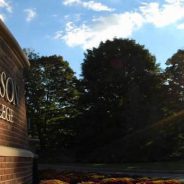Search results for :
How To Become A Financial Director After Earning An MBA
The finance industry is among the most popular destinations for MBAs to seek employment following graduation—finance and accounting make up 22 percent of all MBA jobs and more than 84 percent of finance and accounting firms planned on hiring MBA graduates in 2016. Continue reading…
The Best Part-Time New York City MBA Programs
Not everyone can afford to quit their job to go back to school full time for an MBA. Thankfully, you don’t have to. If you live in New York City, there are over half a dozen part-time MBA programs for you to choose from, but with such a large list it can be difficult to choose the best program for you.
That’s why we’ve outlined the best part-time New York City MBA programs to help you out. Each of these programs offers something that helps it stand out from the rest. Continue reading…
Admissions Tip: Welcome Weekends
It’s April, which means that the majority of leading programs will be hosting business school welcome weekends for those candidates that they have admitted during their first two admissions rounds. These “sell” weekends are very important for the schools as part of their push to encourage those that they have admitted to enroll. They know that many of their admitted students have options to go elsewhere, or are now considering the financial aspects of the program and concerned as to whether it is an economically viable option.
If you were fortunate enough to gain admissions to an elite MBA program, this post is for you. We explain the importance of attending welcome weekends and what you should want to learn.
What Are The Best Philadelphia Executive MBA Programs?
The intoxicating allure of the Executive MBA promises better pay, enhanced skills and a shortcut on your up to the higher rungs of the corporate ladder. For those looking to make a career on the East coast, what are the best Philadelphia Executive MBA programs to look out for?
The Premiere San Francisco Accelerated MBA Programs
An MBA is a commitment in terms of money, energy and, yes, time. The time investment is perhaps the most intimidating, with the majority of MBA programs averaging two years. But earning an MBA doesn’t necessarily need to disrupt your life. There are a variety of phenomenal Accelerated MBA programs, wherein you can receive the same education without the daunting time commitment.
San Francisco Accelerated MBA Programs
Leavey School of Business—Santa Clara University
Santa Clara University’s Leavey School of Business has an Accelerated MBA option that allows students to earn their degree in less than two years. Leavey’s program holds classes on Thursday nights and all day Saturdays. The program provides a cohort experience, so students move through the core program together, though they can tailor electives to their interests and professional aspirations. Student’s must maintain a cumulative GPA of at least 3.0 in order to receive their degree. This is an intensive, 70-credit program that will take place over seven terms. The coursework includes 11 core classes and 23 units of electives. There are nine options for concentrations, including: Business Analystics, Digital Marketing and eCommerce, Entrepreneurship and New Venture Creation, Financial Planning and Controllership, Finance, Business in the Global Context, Leading Innovative Organizations, Managing Customer Relationships in Business and Tech Markets and Supply Chain Management. Leavey students have access to a variety of student network events, career management seminars, career fairs, career counseling and prestigious academic awards.
F.W. Olin Graduate School of Business—Babson College
At Babson College’s F.W. Olin Graduate School of Business, students can earn their MBA in just 12 months. Accelerated MBAs have access to all the same courses and learning opportunities as students in the standard full-time program. The standard full-time MBA is two year and requires 55 credits, whereas the accelerated program requires that students accrue just 40.5 credits to graduate. Students in this program complete 14 core course credits during the summer, and go on to complete 27 elective credits in the spring. Students tailor their electives to fit their career goals, and can earn a concentration in Entrepreneurship, Finance, Global Management, Business Analytics or Marketing. During the spring term, students are also expected to seize internship opportunities. Baboon also offers Signature Learning Experiences (SLE). These SLEs are unique courses and activities designed to expose students to the rewards and challenges of entrepreneurial decision-making.
Lucas Graduate School of Business—San Jose State University
San Jose State University’s Lucas School of Business provides a special accelerated MBA option for those who are new to the working world, and still determined to earn an MBA. This program may appeal to prospective students who have only recently realized their interest in furthering their business eduction, as Lucas’s program is open to students without an undergraduate degree in business.The Early Career MBA classes meet on the San Jose State University main campus during the evenings and on Saturdays. The program is structured in two month sessions (six to eight weeks per class). This track is specifically for students with zero to five years of work experience, and can be completed in 12 months. Applicants should have a 3.0 cumulative GPA or higher during their undergraduate educations. Students applying should have scores that are in at least the 50th percentile in both the verbal and quantitative sections of the GRE. Students on this track take 11 core courses and four elective courses.
Washington DC International/Global Business MBA Programs
There’s no doubt that the world has grown smaller as it’s become increasingly easier to connect and travel across vast distances. And that shrinking of the world stage has been nowhere more evident than in business. Today, it’s nearly impossible to imagine working in an industry that doesn’t have global implications. And that’s why many business schools have stepped up to the plate to start offering global business MBA programs. Continue reading…
What Are The Most Affordable Boston MBA Programs?
Living in Boston isn’t cheap. According to Expatistan Cost of Living Index, Boston is the sixth most expensive city in North America. On average, people pay between $1,641 (480 sq. ft.) and $2,812 (900 sq. ft.) per month for rent, depending on location and size of the apartment. Then, by the time you add on utilities, food, transportation, personal care and entertainment, living and working in the city can look exceptionally pricey. And costs only increase when you add on an MBA education. That’s why an affordable Boston MBA program is so important.
With the average cost of a top 10 MBA tuition set around $120,000 over two years, breaking the bank may feel especially draining. So, to help you out, we’ve compiled the top five most affordable MBA programs in Boston. Continue reading…
Financing Your MBA, Part 4
In our previous post on financing your MBA, we covered loan programs for MBA students from the United States. Today, in Financing Your MBA, Part 4, we’ll take a look at loans through the lens of international students. These applicants may face some different restrictions but are also eligible for special programs tailored to their unique requirements.
By law, federal loans can only be distributed to U.S. citizens or permanent residents. This means that international students must put extra work into finding financial aid and loan programs to support their education if they choose to pursue a U.S. MBA program.
International students should research their own countries’ options for financing studies abroad, and schools’ financial aid offices are also useful resources in this regard. For instance, MIT Sloan lists 16 scholarships or fellowships geared towards international students.
Private Lenders for International Students
International students can also consider U.S.-based private loans, but they should recognize that many of these loan programs require a U.S. co-signer. Understanding that this can prove a hardship for those without a U.S. connection, some schools offer internal options for international students. For instance, Harvard Business School has partnered with the Harvard University Employees Credit Union to offer private educational loans that do not require a U.S. co-signer. NYU Stern also features a list on its website of loan providers that don’t require international students to have a U.S. co-signer. Consulting with your target schools’ financial aid offices is a great way to learn about available loan options.
International students should keep in mind that U.S. lenders are typically not allowed to issue loans to students from countries on the United States Treasury Department’s Office of Foreign Assets Control (OFAC) Sanctions list. The Treasury Department encourages prospective students to check this list with some regularity, as it is frequently updated.
Also addressing the need for non-co-signer loans, companies like Prodigy Finance have entered the market in recent years. Founded by INSEAD alumni who faced funding challenges themselves as international MBA students, Prodigy offers loans using an innovative community-financed model in which alumni, institutional investors and qualified private investors fund the next generation of MBA students.
This article has been edited and republished with permissions from Clear Admit.
Financing Your MBA, Part 3
Moving right along in our multi-part series on financing your MBA, we’ll take a look today at some of the options prospective MBA students have for obtaining loans to finance their time at business school. For the purposes of this post, we will focus primarily on loan programs for U.S. students. International students, stay tuned for subsequent posts that will go into greater detail about loan programs tailored for your needs.
2017 Pacific Northwest MBA Conference: April 8, 2017
On Saturday, April 8, the 2017 Pacific Northwest MBA Conference—a premier MBA networking and empowerment event held yearly—is heading to Washington. This year, topics of conversation will include everything from the power of diversity to startups and the life of a CEO.
Held at the UW Bothell North Creek Events Center, attendees will have the opportunity to learn from subject matter experts and industry leaders on a variety of subjects such as leadership, corporate social responsibility, finance, operations, strategy, marketing, entrepreneurship and more. Continue reading…
MBA Jobs: Corporate Development Associate
Strategy and leadership development are at the core of almost every MBA program. In fact, they’re two of the skills most often mentioned when candidates discuss why they want to go back to school. But when it comes to narrowing down a career path that best takes advantage of those skills, how do you make a decision? If you enjoy mergers and acquisitions (M&A) as well as planning and executing strategies to meet organizational objectives, then you might want to consider a role as a corporate development associate.
With 10-year job growth—through 2022—expected at 41.2 percent, a career as a Corporate Development Associate is an excellent choice for MBA graduates. Continue reading…
Babson’s MBA Program Ranked #1 for Entrepreneurship 24 Years in a Row
For the 24th year in a row, U.S. News & World Report has named Babson’s MBA Program No. 1 for entrepreneurship. This ranking places Babson College’s F.W. Olin Graduate School of Business ahead of Stanford Graduate School of Business (No. 2), Harvard Business School and MIT Sloan School of Management (tied at No. 3), and UC Berkeley’s Haas School of Business (No. 5). Twenty-four years is a long time to lead the world in any area, and to do so in entrepreneurship education—a field that is constantly evolving—requires regular innovation. Continue reading…
Claremont Professor Tom Kneisner Consulted in OSHA Debate
The government regime change will likely yield a new direction for the Occupational Safety and Health Administration (OSHA). The expectation is that OSHA will move away from enforcement and toward compliance assistance for employers.
Amidst debate about the extent of OSHA’s ability to minimize workplace injuries, WorkCompCentral reached out to Tom Kniesner, an economics professor at Claremont Graduate University’s Peter F. Drucker and Masatoshi Ito Graduate School of Management.
Kniesner has long held the belief that OSHA enforcement does not decrease workplace injuries. The Claremont professor asserted that workers’ compensation is a more effective way to foster a safe work environment. In fact, Kniesner co-wrote a piece with John Leeth in 1995 titled “Abolishing OSHA,” in which he argued that OSHA is ineffective and should be scrapped entirely.
In the article, the authors suggested that: “OSHA can never be expected to be effective in promoting worker safety; that an expanded OSHA will cost jobs as well as taxpayer dollars; and that other means currently keep workplace deaths and injuries low and can reduce them even more.”
“Rather than wasting more resources on an agency that cannot be effective, policymakers would do better to shut down OSHA and allow state and local officials to better utilize their own means to ensure worker safety,” Kniesner and Leeth said.
According to his article, Kniesner’s research has not shown any significant reduction in injuries due to OSHA’s policies. He contends that state workers’ compensation rules and tort law provide the majority of workers’ on-the-job protection.
The professor holds that OSHA is ineffectual, as inspections are infrequent, its fines are not heavy and it does not regulate many of the main safety issues facing workers.
MBA Jobs: Business Operations Manager
Operations management is a field that’s key to business. While it has nothing to do with operations in a medical sense—obviously, this is an MBA website after all—the field’s multidisciplinary nature may make it difficult to understand at first. So let’s get to it! Continue reading…
Financing Your MBA, Part 2
In the first of our multi-part series on financing your MBA, we took a look last week at the costs involved in attending a top-tier business school. Now, with a better handle on how much money you’ll need, let’s start looking at where that funding will come from.
Students typically rely on a mixture of savings, fellowships and scholarships, employer or outside assistance, and loans to meet the cost of an MBA program. According to the GMAC 2016 Prospective Student Survey, prospective students expect to finance almost half their education through a combination of grants, fellowships and scholarships (26 percent) and loans (20 percent). Other anticipated sources of aid include personal savings, parental support, employer support and spousal or partner earnings.
Meanwhile, estimates from several top programs suggest that between 30 and 50 percent of students receive some form of fellowship or scholarship. For instance, the Stanford Graduate School of Business calculates that 50 percent of its students receive fellowships funds, while New York University’s Stern School of Business states that up to 20 percent of its full-time MBA students receive merit-based scholarships. Harvard Business School (HBS), one of the few schools to solely offer need-based aid, reports that 50 percent of students are eligible for needs-based Fellowships. About half of all HBS students receive approximately $37,000 each year through need-based fellowships, the school says.
The best place to find information about a particular program’s financial aid offerings is the business school’s financial aid office, which may be run by the parent university. Along with providing substantial information about school-based fellowships or scholarships, financial aid officers can also help students navigate the loan application process and secure alternative sources of funding. In addition, free online resources such as finaid.org, scholarships.com or Peterson’s Award Database can provide students with further guidance in financing their degrees.
School-Based Financial Aid
Schools often offer a variety of options to help students pay for their education. These options can include merit- or need-based business school scholarships or fellowships, university-wide scholarships, work-based opportunities such as research assistant or teaching assistant positions, and lists of outside resources. To find out more about a particular school’s offerings, students should refer to the financial aid or cost of attendance section of a school’s website or contact the school’s financial aid office directly.
Merit-and Diversity-Based Fellowships and Scholarships
Most scholarships provided by schools are awarded based on merit, meaning they are offered to students who have demonstrated qualities such as academic excellence, professional aptitude or outstanding leadership. Merit-based scholarships are usually awarded at the admissions committee’s discretion in order to attract the highest caliber students and can cover the full cost of tuition.
To enhance the diversity of a class, private donors, alumni and corporations also can endow a variety of scholarships or fellowships targeted towards applicants with a particular career interest, educational background, nationality, racial or ethnic identity, or gender. In addition, some schools offer financial awards to students who are already enrolled and have demonstrated leadership on campus or exceptional academic ability.
The process of applying for scholarships and fellowships varies by school. In some cases, students are automatically considered for these awards when they submit their applications to an MBA program, with no additional work required. Alternatively, some scholarships and fellowships require an additional essay, submitted either at the time of application to the program or after acceptance. A large majority of merit- and diversity-based awards are time-sensitive or based on a first-come, first-served process, so students are encouraged to apply early in the MBA admissions cycle.
Scholarships provided directly by a school are typically offered on a consistent basis year to year. However, endowed fellowships or private scholarships may not always have funds available. Students applying separately to these scholarships and fellowships should check with the head of each program to ensure they are being offered that year.
Need-Based Awards
Though not as widely available, schools may offer financial aid based on students’ demonstrated financial needs. Certain leading schools, such as Harvard, are notable exceptions to this trend in that all of the fellowships they offer are based on financial need. Need-based aid may come in the form of a grant, which does not need to be paid back, or a low-interest loan.
When deciding whether to offer a student need-based aid, the financial aid office typically weighs the student’s income from previous years; his or her spouse’s financial situation; any assets such as stocks, trust funds or home equity; and other outside funding such as employer assistance. Schools compile this information by either asking students to fill out school-specific forms or, in the case of U.S. citizens and permanent residents, using information found in the Free Application for Federal Student Aid, more commonly known as the FAFSA.
School-Based Work Opportunities
MBA programs typically discourage full-time students from working during their studies. However, some business schools, like Stern, do offer work-based financial assistance, in which students apply to work with professors on research projects or help teach classes in exchange for tuition reimbursements. These opportunities may pay up to $20,000 a year and are usually available after a student has been enrolled for at least a semester.
Loan Repayment Assistance Programs
Loan Repayment Assistance Programs (LRAPs) are designed to encourage students to pursue careers in the public and nonprofit sectors, which generally offer lower salaries than those in the private sector, by offering assistance on loan repayments. While the individual requirements of each program vary by school, LRAPs typically require that a graduate work full-time, receive an income below a certain threshold and demonstrate they required financial aid during their MBA studies. Financial support from these programs varies from covering a certain percentage of a student’s loan to assuming the full cost of a loan payment.
Next up in the series, we’ll provide an overview of private scholarships, as well as public and private loan programs. In subsequent posts we’ll examine options for international students, specific financial aid programs at individual schools and more. So stay tuned.
This article has been edited and republished with permissions from Clear Admit.
Financing Your MBA, Part I
As more and more of you are receiving your admissions results from all your hard work during the MBA application process, we wanted to turn our attention to how you’ll manage financing your MBA.
If you’ve got a spare couple hundred thousand dollars in your bank account, then you can probably skip this series. For everyone else, read on. In this post and a handful to follow, we’ll provide a broad overview of the various costs a typical MBA student faces and the types of funding opportunities currently available. Down the line, we’ll take a closer look at the financial aid processes at a diverse range of leading business schools, giving you the tools you need to assess MBA programs in light of both your own goals and available financing options.
If you’re just beginning to think about an MBA, this series can help map out the landscape, outlining the financial aid process and resources available at various programs. You can extend your research by consulting the Clear Admit School Guides and schools’ own websites, as well as through conversations with current students.
First Things First: What’s an MBA Going to Cost?
The first step in financing the MBA is getting a handle on how much it will cost. The primary expense of an MBA program is tuition. Having said that, there are a variety of other costs—including living expenses, course materials and additional fees—that can increase the total amount a student pays by a half again. Most business schools provide a breakdown of the expenses, which are posted under the financial aid or admissions section of their websites in order to help prospective students seriously consider the cost of completing a particular MBA program. Schools typically take the total cost of attendance into account when calculating the financial aid package students receive.
Tuition
Tuition at the top business programs has risen steadily for decades, often at a rate above inflation. Students can now expect to pay between $50,000 and $75,000 for a single year’s tuition at a top school, with an average total price tag of $130,000 for tuition alone. Public universities, which discount tuition for state residents, can sometimes be more affordable. For instance, in-state residents attending schools such as UT Austin’s McCombs and UNC’s Kenan-Flagler pay about $15,000 less in tuition each year than do out-of-state residents. The range of variance of costs that in-state residents pay can be explained in part by the different levels of subsidies that public universities receive and the economies of the states in which they are located.
Living Costs
The cost of living also forms a substantial part of a student’s expenses while at business school. These costs typically cover housing, food, utilities and other personal expenses, and they can vary widely by geographic region. For example, the Fuqua School of Business, located in the college town of Durham, North Carolina, estimates that students will pay $12,800 for room and board in their first year. Meanwhile, at NYU Stern, located in the center of Manhattan in New York City, the estimated cost for room and board is $25,170.
Living costs are usually based on surveys of the student population or estimates of local rental costs. Students should keep in mind that the figures posted by most schools are for single students with no dependents; those with partners or children should take into account the additional expenses of balancing family life with full-time studies. Harvard Business School, for instance, estimates that students with a spouse or partner should set aside an additional $16,900 in yearly expenses for a spouse or partner, another $13,100 for one child and an additional $8,500 for a second child. Meanwhile, Tuck, with its rural New Hampshire campus, calculates that $7,500 should be set aside for each additional family member. Prospective students with further questions may contact their target programs’ financial aid offices in order to request information about expected family expenses.
Additional Expenses and Fees
Course materials, healthcare insurance, transportation costs and other mandatory university fees can add several thousand dollars to a student’s expenses each year. For example, Wharton’s Pre-term fee is $2,000. Furthermore, extracurricular activities, particularly international trips that are often a highlight of an MBA experience, can substantially increase costs; for example, the Kellogg Worldwide Experience and Service Trips (KWEST) run into the thousands before considering a number of additional out-of-pocket expenses. To help cover these expenses, some schools allow students to apply for an increase to their cost of attendance and thereby take on more loans.
Loan Interest
Because recent legislature has rendered federally subsidized loans unavailable for U.S. citizens or permanent residents in graduate school, students relying on loans to fund their studies will see their interest accumulate while in business school. For the most part, students do not have to start paying that interest, or the principle, until several months after they graduate. Federal loans and some private loans also include an ordination fee that is tacked on to each loan disbursement. We’ll go into greater detail on loans in a later post in this series.
Stay tuned for future posts in this series, where we’ll take a closer look at the range of financing options available to MBA students—including school-based financial aid, private scholarships and loan programs—as well as specific resources for international students.
Top Scholarships at Columbia Business School
Earning an MBA from Columbia Business School (CBS) is an incredible opportunity. It is no secret that CBS offers an enviable education, but it is also located in the heart of New York City, where MBA students will be surrounded by opportunities and industry giants. Of course, being in the fastest-paced, most populous city in the United States comes at a price. Literally. New York is listed as number one on Investopedia’s Top 10 Most Expensive Cities in the U.S. Luckily, CBS offers a wealth of scholarships to make grad school in the city more manageable.
Merit-Based Scholarships
Merit-based scholarships are an excellent option for motivated students with impressive undergraduate GPAs and work experience. Also, if students do not receive a fellowship in their first year, they will have another opportunity in their second year.
• Forté Foundation Scholarship: The Forté Foundation offers scholarships to outstanding women through their Forte Fellows program. The fellowship exists to encourage larger numbers of women to pursue an MBA education. There is no application information required from students at CBS, as nominees are selected by the school’s director of admissions. Forté Fellows receive multiple benefits, including participation in the MBA Women Leadership and Financial Services FAST Track Conferences. Students in the program are also included in the Forté Fellow resume book, which is distributed to Forté Sponsor companies like J.P. Morgan and IBM Global Business Services.
• Toigo Fellowship: CBS is one of the Robert Toigo Foundation’s featured MBA programs. The Toigo Foundation’s mission is to encourage diversity in finance, so this fellowship is available to under-represented groups. Driven minority students will be eligible for consideration. Fellows attend a weekend summer session to prepare them for business school. During this session, students are assigned mentors to guide them throughout school and their careers.
• Columbia Fellows Program: Columbia Fellows is available only for the first year of the program. The scholarship includes a partial- or full-tuition award for applicants who have shown the creativity and initiative to be true leaders in business.
• Board of Overseers China & India Fellowships: This fellowship is available to students from China and India. Scholarships are awarded by the Board of Overseers, which is comprised of industry giants across a variety of fields.
• Meyer Feldberg Distinguished Fellowship Program: This fellowship is extremely competitive and is granted to students who have shown outstanding leadership skills and academic initiative. Students applying must demonstrate an impressive track record in areas like entrepreneurship and social ventures. Fellows are given full tuition and lifelong membership in the prestigious network of award recipients and donors.
.
• R.C. Kopf Fellowships: The R.C. Kopf Fellowship is granted to students with an interest in international business. Italian, French, British and U.S. citizens can all earn the Kopf Fellowship. Applicants should be accomplished in academia, but also exhibit personal and professional behavior that makes them an asset to the community.
• Gerardo Werthein Scholarship: This scholarship is specifically for MBA students who have lived or studied in Argentina and who are interested in returning to work in Argentina. The scholarship is granted based on financial need.
• Ela Lemelbaum Scholarship: Israeli students are eligible to receive the Ela Lemelbaum Scholarship, which provides tuition support options for both first and second years of study. Preference goes to students who have studied at the Interdisciplinary Center in Herzliya, Israel. This scholarship is renewable during the second year.
Other Scholarship Opportunities
CBS also offers a variety of need-based scholarships to students, which may yield tuition support ranging from $7,500 to $30,000. Need-based scholarships are based on every aspect of a student’s assets. About 50 perfect of applicants are granted need-based awards. These scholarships are automatically renewed during a student’s second year. There is a rigorous four-part application process. Students may also seek out and apply for external scholarships.
Chicago Booth Alumni Spotlight: David Lawee, Google
David Lawee, Canadian born entrepreneur and current Vice President of Corporate Development at Google, is a business titan the Booth School of Business at the University of Chicago is surely proud to call an alum.


















